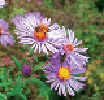Agriculture Reference
In-Depth Information
• Become familiar with how a colony of bees operates. While learning, examine
your colonies often, checking the broodnest boxes for signs of a healthy, productive
queen, healthy brood and the right amount of it, plenty of pollen and honey stores,
the right mix of workers and drones for the time of year, and any maladies that are
present.
• Manage your colony for swarm prevention and control, but know that some colonies
will swarm, no matter what you do. Have a bait hive in your yard, if possible. An-
swer swarm calls with care and caution.
• Requeen every colony every year with queens from producers actively seeking ge-
netic resistance to pests and diseases in their bees. This is the only long-term solu-
tion to reducing pesticide use in your hives. Ask hard questions, demand good an-
swers, and expect to pay top dollar. Recall that bad queens never get better, and
cheap queens are just that.
• Be patient when introducing queens. Leave the cage in the colony at least five days
before removing the cork, and then allow three more days for the bees to remove
the candy. It's the safest way there is.
• Monitor pest populations all season and be prepared to act if they suddenly increase.
Treat if required, but don't treat “just because.“
• Actively follow integrated pest management (IPM) techniques and methods to avoid
or reduce pest populations and hard chemical controls.
• Always remember that honey is a food, and your family will eat it. Treat it as such.
Before you continue to the next section, here are a few guidelines to keep in mind.
They're not carved in stone, but maybe they should be.
• There isn't a lot of work to keeping bees, but what you have to do, you have to do
on time.
• Always dress and work with your bees so that you feel safe and secure, and your
bees are not threatening anyone nearby.
• Your family, neighbors, and friends should not have to change their lives because
you did (unless they want to).
• You should care for your bees the best you can, recognizing your responsibility for
their well being.
• Beekeeping should not overwhelm your life. It is part of your life, not all of it.

